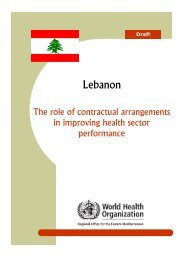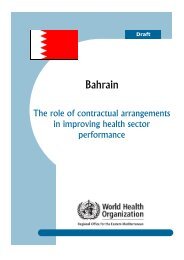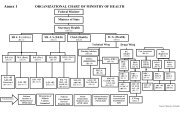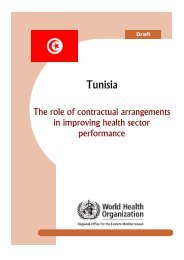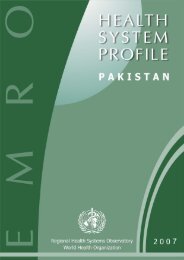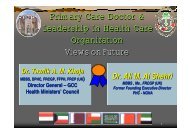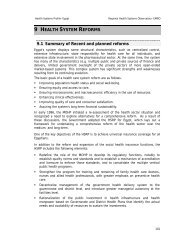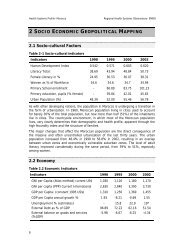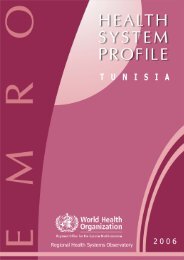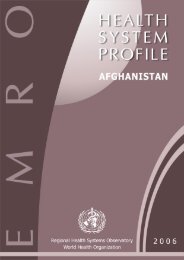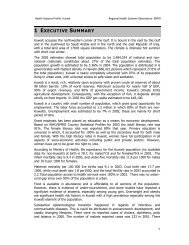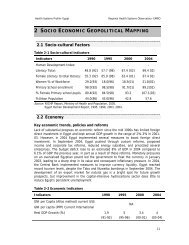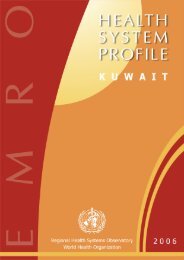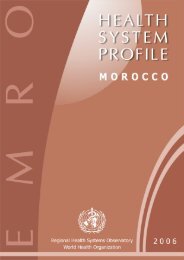Social determinants of health in countries in conflict - What is GIS ...
Social determinants of health in countries in conflict - What is GIS ...
Social determinants of health in countries in conflict - What is GIS ...
Create successful ePaper yourself
Turn your PDF publications into a flip-book with our unique Google optimized e-Paper software.
<strong>Social</strong> <strong>determ<strong>in</strong>ants</strong> <strong>of</strong> <strong>health</strong> <strong>in</strong> <strong>countries</strong> <strong>in</strong> <strong>conflict</strong> 57<br />
importance <strong>of</strong> dialogue and openness, and the need for participants <strong>in</strong> dialogue to be<br />
freed from th<strong>in</strong>k<strong>in</strong>g strictly with<strong>in</strong> the framework <strong>of</strong> their own <strong>in</strong>terests and oppositional<br />
positions.<br />
At national level dialogue needs to be <strong>in</strong>itiated to recognize the major challenges<br />
that are be<strong>in</strong>g faced, such as governance, social and economic <strong>in</strong>equity, low education<br />
levels, human rights and foreign occupation. Health can be a bridge for peace, a way<br />
<strong>of</strong> beg<strong>in</strong>n<strong>in</strong>g a transformational dialogue about such <strong>is</strong>sues. Although public debate<br />
about <strong>health</strong> <strong>is</strong> rare <strong>in</strong> most <strong>countries</strong> <strong>of</strong> the Region, gett<strong>in</strong>g the social and political<br />
<strong>is</strong>sues underly<strong>in</strong>g <strong>health</strong> problems on to the agenda could have positive effects on the<br />
Region’s current socioeconomic–political dilemma. The <strong>in</strong>creas<strong>in</strong>g reach <strong>of</strong> global <strong>health</strong><br />
organizations can have a positive impact only if they support a consensus on the value<br />
<strong>of</strong> primary <strong>health</strong> care to strengthen <strong>health</strong> systems <strong>in</strong> both stable and <strong>conflict</strong>-affected<br />
areas. The <strong>in</strong>creas<strong>in</strong>g range and scope <strong>of</strong> <strong>in</strong>ternational organizations, the recognition <strong>of</strong><br />
civil society as a “voice” <strong>of</strong> the people, and <strong>of</strong> the human rights agenda and <strong>in</strong>ternational<br />
humanitarian law can have a positive impact. They present opportunities for people and<br />
organizations with<strong>in</strong> the Region to open up dialogue, with external and <strong>in</strong>ternal actors,<br />
about the problems faced by fragile <strong>countries</strong>, such as lack <strong>of</strong> arms control, prejudicial<br />
terms <strong>of</strong> trade, and food and resource scarcity, all <strong>of</strong> which exacerbate armed <strong>conflict</strong>.<br />
There <strong>is</strong> a need to leverage the potential <strong>of</strong> regional and global forums such as the<br />
League <strong>of</strong> Arab States, the European Comm<strong>is</strong>sion, the Group <strong>of</strong> Eight (G8) and the<br />
United Nations, to promote and protect the <strong>health</strong> <strong>of</strong> populations liv<strong>in</strong>g <strong>in</strong> <strong>countries</strong><br />
under occupation or civil strife. The League <strong>of</strong> Arab States may have a special role to<br />
play <strong>in</strong> many <strong>countries</strong> through the promotion <strong>of</strong> human rights, democracy and good<br />
governance. Development agencies, especially agencies such as WHO which has a<br />
special mandate to respond to <strong>health</strong> needs <strong>in</strong> cr<strong>is</strong><strong>is</strong> sett<strong>in</strong>gs, should work together to<br />
provide <strong>health</strong> services. They can also act as advocates, with other global <strong>in</strong>stitutions,<br />
to use <strong>health</strong> as a bridge for peace <strong>in</strong> the world. The mandate <strong>of</strong> WHO to provide <strong>health</strong><br />
data extends to present<strong>in</strong>g evidence on the impact <strong>of</strong> <strong>conflict</strong>s on <strong>health</strong>; th<strong>is</strong> <strong>is</strong> essential<br />
advocacy material that <strong>is</strong> needed to spur action by all partners on address<strong>in</strong>g <strong>health</strong> and<br />
well-be<strong>in</strong>g <strong>in</strong> <strong>conflict</strong>-affected <strong>countries</strong>. There are also a large number <strong>of</strong> organizations<br />
from <strong>countries</strong> <strong>of</strong> occupation forces which support the promotion <strong>of</strong> civil liberties and<br />
human rights, and the protection <strong>of</strong> <strong>health</strong> not just for their own citizens, but equally, for<br />
vulnerable populations across the globe; their potential needs to be harnessed.<br />
As noted <strong>in</strong> Chapter 7, collaboration between the many actors responsible for <strong>health</strong><br />
care <strong>in</strong> cr<strong>is</strong><strong>is</strong> <strong>is</strong> essential. M<strong>in</strong><strong>is</strong>tries <strong>of</strong> <strong>health</strong> <strong>in</strong> <strong>countries</strong> <strong>in</strong> <strong>conflict</strong> are weakened and<br />
care may be provided by voluntary, non-pr<strong>of</strong>it organizations. The role <strong>of</strong> m<strong>in</strong><strong>is</strong>tries <strong>of</strong><br />
<strong>health</strong> <strong>in</strong> regulat<strong>in</strong>g and manag<strong>in</strong>g the activities <strong>of</strong> nongovernmental organizations,<br />
rationaliz<strong>in</strong>g the prov<strong>is</strong>ion <strong>of</strong> <strong>health</strong> services <strong>in</strong> all geographic areas and <strong>in</strong> ensur<strong>in</strong>g<br />
equitable access <strong>is</strong> vital.<br />
SDH-chapters-<strong>countries</strong> <strong>in</strong> <strong>conflict</strong>-7 Oct.<strong>in</strong>dd 57 08/10/2008 14:24:54



